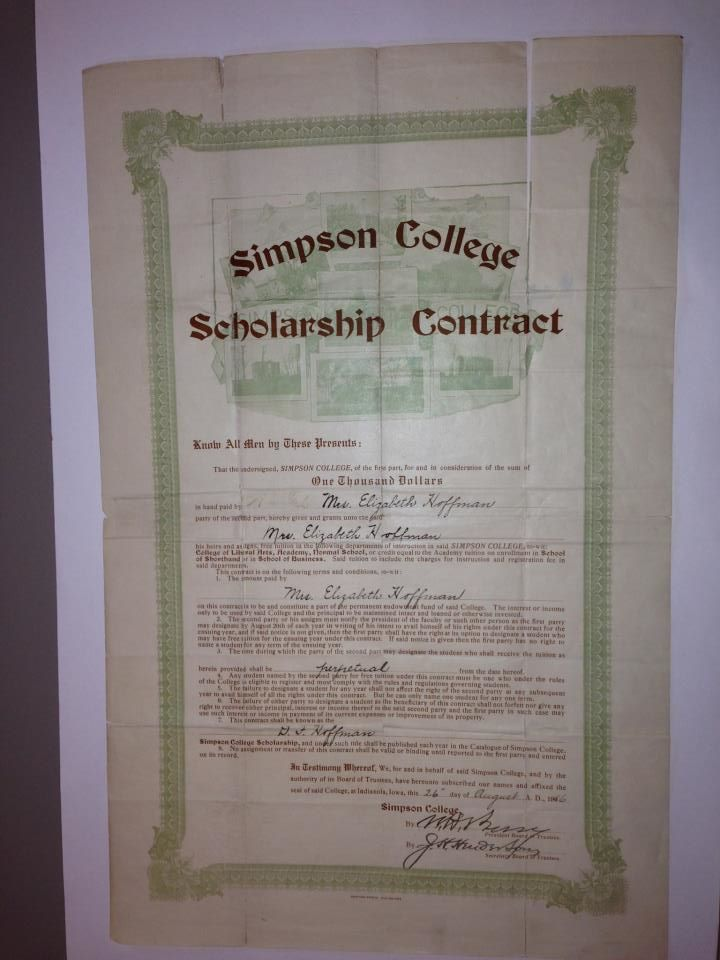Many colleges sold perpetual scholarships in the first half of the 1800s. It was a creative, yet poorly thought out scheme to bring in much needed funds. According to historian Frederick Rudolph, the perpetual scholarship idea was “particularly attractive idea to the colleges because it promised to solve their basic problems: it would give the colleges the funds that they badly needed in order to stay open, and it would provide them with an immediate supply of students who would justify their being open at all.” The idea might have worked if the institutions had invested the funds prudently instead of using the income for operating expenses.
The Perpetual Scholarship pictured below was sent to me by a friend who asked me to get it to Southern Illinois University Carbondale. The $1,000 given to the college in 1879 is more than $22,700 in 2013 funds. The certificate states:
Whereas, (insert name) has paid to the Trustees of Shurtleff College, of Alton, Illinois, the sum of One Thousand Dollars, the receipt whereof is hereby acknowledged, the said Trustees do hereby grant, sell and convey to the said (insert name) heirs, executors and assigns, a Perpetual Scholarship in said College, entitling the legal owner hereof to perpetually send one student, free of tuition, to any and all departments now established in the said Institution or hereafter to be established by said institution.
In Testimony Whereof, The President of said Board of Trustees, by them duly authorized, has hereto set his name and affixed the seal of this Corporation, this Twenty second of January A,D, eighteen hundred and seventy nine.
Many of the institutions that offered these perpetual scholarships no longer exist. Shurtleff College is among that list, although it lasted decades longer than some of the other small colleges that sold the scholarships. In 1827, Baptist Minister Reverend John Mason Peck founded Alton Seminary, named for the Illinois town in which it was located. Dr. Brendon Shurtleff of Boston donated $10,000 to the college and, in 1836, it took on his name. Sigma Zeta, the science and mathematics honor society, was founded at the college. The organization’s founders were young Shurtleff faculty members Elmer E. List, Ralph K. Carleton, and J. Ellis Powell, at whose home the organization was founded on Thursday, October 1, 1925.
At the time that it closed, Shurtleff had the distinction of being the oldest Baptist college west of the Appalachians. On June 30, 1957, the school became part of the Southern Illinois University system. Although a record number of students, 700, were enrolled in 1950, the last 28 students graduated in 1958. The SIU campus in Alton saw an influx of students, however, in 1965, SIU opened a campus in Edwardsville (now Southern Illinois University Edwardsville – SIUE). Seven years later the Board of Trustees made the decision to use the Alton campus for the SIU Dental School.
McKendree College in Lebanon, Illinois, broke even on the sale of perpetual scholarships, according to Rudolph. For every dollar it raised by selling scholarships, McKendree lost a dollar. He also noted that Dickinson College in Carlisle, Pennsylvania, was running at a $3,000 deficit after only four years of selling the scholarships. The college was full of students not paying tuition and the money raised by the scholarships had long since been spent.
From 1853-1867, Northwestern University in Evanston, Illinois, sold $75,000 worth of perpetual scholarships in order to fund building construction. Most of Northwestern’s perpetual scholarships cost $100 when they were sold. About 350 students have made use of those scholarships, one graduating as recently as 2002. Barrett Bridenhagen’s great-great-grandfather purchased one of the scholarships and because all the strict guidelines placed on the scholarships in 1959 had been met, she was able to use the scholarship. Potential recipients need to meet all admission qualifications. Other rules made in 1959 state that the scholarship covers only tuition, not room, board or fees and only one family member per generation may use the scholarship.
After I posted this, Kylie Towers Smith, Kappa Kappa Gamma’s Archivist/Museum Curator, sent me this scan (below) of a Simpson College Scholarship Contract. ” I went to Simpson College on the hopeful promise of a perpetual scholarship, but my outstanding student loans attest otherwise. It’s a good thing my experience was priceless!”
My thanks to a friend who sent me the Shurtleff certificate to give to the archives at SIU. I remember Dr. Jeff Aper discussing them in a History of Higher Education class but I never thought I’d see one up close and personal.
© Fran Becque www.fraternityhistory.com


